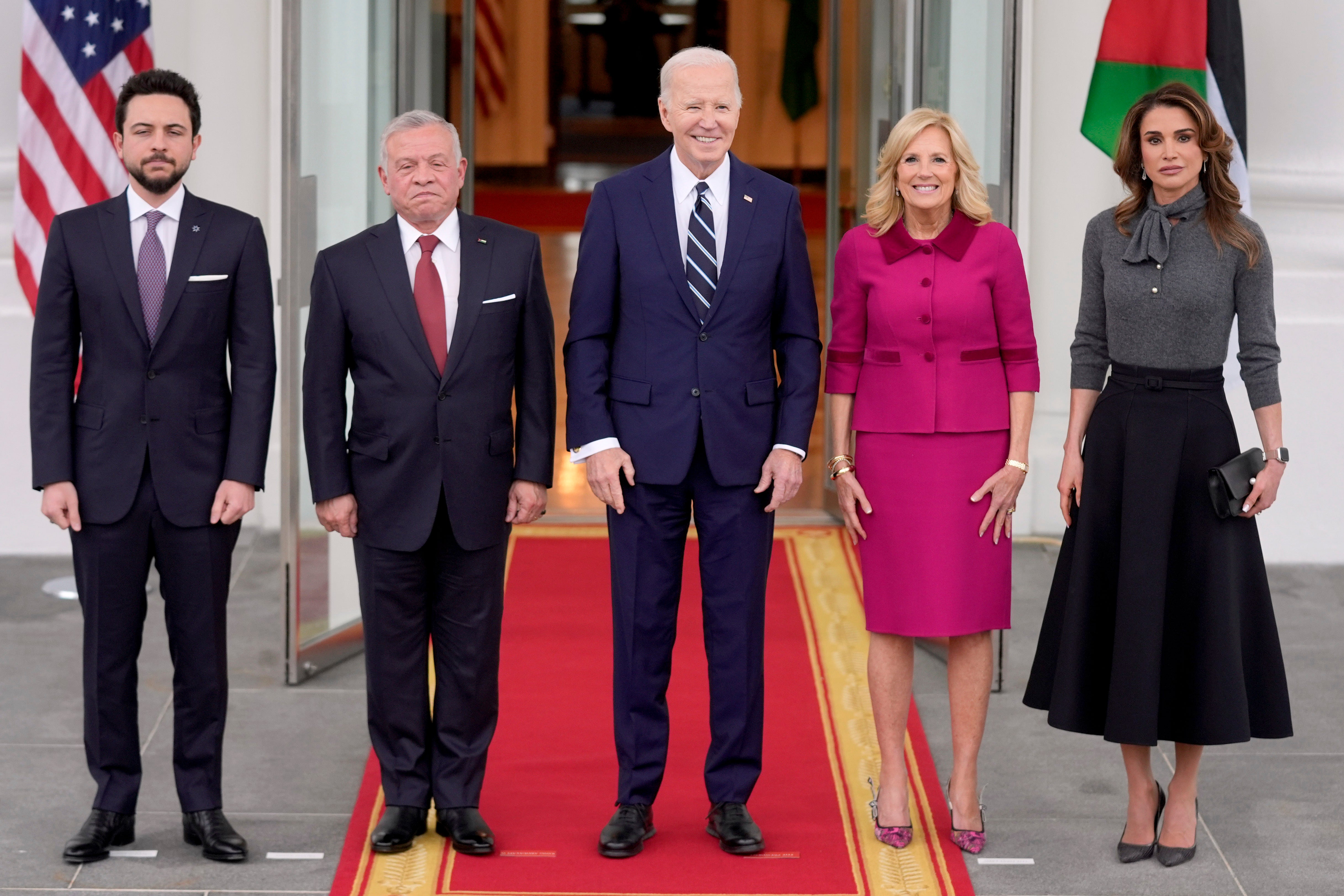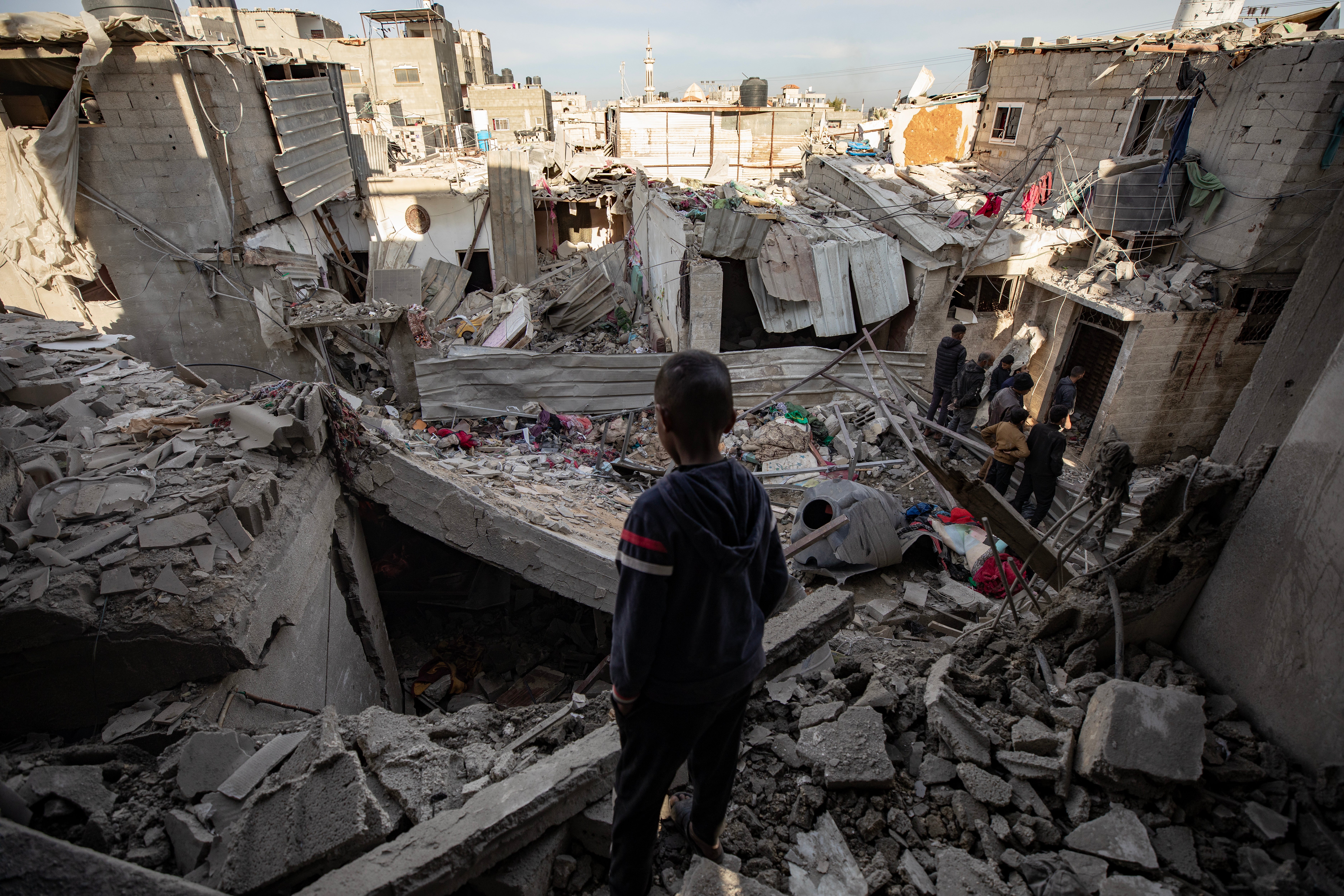Biden says Israeli attack on Rafah should not take place without a ‘credible’ plan to protect civilians
Proposal to attack Rafah, where most Gazans have fled to, has drawn criticism from Israel’s Western allies
Your support helps us to tell the story
From reproductive rights to climate change to Big Tech, The Independent is on the ground when the story is developing. Whether it's investigating the financials of Elon Musk's pro-Trump PAC or producing our latest documentary, 'The A Word', which shines a light on the American women fighting for reproductive rights, we know how important it is to parse out the facts from the messaging.
At such a critical moment in US history, we need reporters on the ground. Your donation allows us to keep sending journalists to speak to both sides of the story.
The Independent is trusted by Americans across the entire political spectrum. And unlike many other quality news outlets, we choose not to lock Americans out of our reporting and analysis with paywalls. We believe quality journalism should be available to everyone, paid for by those who can afford it.
Your support makes all the difference.President Joe Biden on Monday said Israel’s planned military operation against Hamas in the Gazan city of Rafah “should not proceed without a credible plan” to ensure “safety and support” for the more than one million civilians who’ve taken shelter there since Israel started its offensive against Hamas in the wake of the 7 October terror attacks.
Speaking alongside King Abdullah II of Jordan at the White House, Mr Biden said he and the Jordanian leader discussed both the Israeli operation and the status of civilians there.
“Many people there have been displaced, displaced multiple times, fleeing the violence to the north, and now they’re packed into Rafah, exposed and vulnerable — they need to be protected,” Mr Biden said.
Israeli airstrikes killed more than 100 people in the city overnight, according to the Palestine Red Crescent Society. Around half of Gaza’s pre-war population is now crammed into sprawling tent encampments and overcrowded UN shelters after fleeing from Israel’s offensive further north.
Israeli prime minister Benjamin Netanyahu last week called for his military to develop a plan to evacuate the city ahead of a planned attack on Hamas holdouts there, as aid agencies warned any such move would be a “bloodbath.”
The president said he has been “clear” from the start of the conflict about US opposition to any “forced displacement” of Palestinians and stressed that he has been in contact with partners in the region to ensure a more steady flow of humanitarian aid into Gaza, both from the Rafah crossing on the Egyptian border and from other points of access.

“We’re working to open other routes as well. And we’re also working relentlessly to make sure aid workers can get the aid where it’s needed,” said Mr Biden, who noted that both the Jordanian leader and members of his family have piloted planes used to airdrop medical and other supplies into Gaza.
The president also reiterated the longstanding US support for a two-state solution to the Israeli-Palestinian conflict, and said the de facto government led by the Palestinian Authority must “urgently reform” to prepare to take over both the West Bank and Gaza after Hamas, which has controlled the latter territory since 2007, has been brought down.
“Once Hamas’ control of Gaza is over, they must prepare to build a state that accepts peace, does not harbour terrorist groups like Hamas and Islamic Jihad, and together we will keep working to complete what we started — to integrate the region, to bring about peace between Israel and all its Arab neighbours, including the Palestinian state,” he said.
While the American president has expressed support for what he has described as an extended “pause” in fighting — something the US has taken pains to differentiate from a hypothetical ceasefire — King Abdullah appeared to harbour no reservations about calling for a full stop to the fighting on both sides, citing an “unbearable” situation in Rafah that is “certain to produce another humanitarian catastrophe” should Israel follow through on plans to attack.

“We cannot stand by and let this continue. We need a lasting ceasefire, now — this war must end,” he said.
The King, who spoke English tinged with a hint of British accent acquired while attending St Edmund’s School in Hindhead, Surrey as a child, said all parties “must urgently and immediately work to ensure the sustainable delivery of sufficient aid to Gaza through all possible entry points and mechanisms” and called for a resumption of full support for the UN Relief and Works Agency, which has come under fire in recent days after some of its’ employees were found to have links to the 7 October attacks.
“Restrictions on vital relief aid and medical items are leading to inhumane conditions. No other UN agency can do what UNRWA is doing in helping the people of Gaza through this humanitarian catastrophe,” he said. “It is imperative that UNRWA continues to receive the support it needs to carry out its mandate”.
The King echoed Mr Biden’s opposition to any displacement of Palestinians from Rafah, telling reporters that the “potential threat of Palestinian displacement beyond the borders of Gaza and the West Bank is something we view with extreme concern and cannot be allowed”.
The leaders’ comments came just hours after National Security Council spokesperson John Kirby said the US would not support the Israeli offensive absent “a proper, executable, effective and credible plan for the safety of the more than a million Palestinians that are taking refuge there.“
Mr Kirby said that evacuating Rafah in a way that protects civilians would be a “heavy lift, but that’s the conversation that we want to keep having with our Israeli counterparts.”
When asked if he believes it’s realistic or viable for Israel to have a goal of moving civilians out of the path of their planned operation in Rafah, Mr Kirby replied: "Let’s see what the Israeli Defense Forces come up with."
“We can’t tell you what’s going to look like, that’s really for the IDF to speak to, but it absolutely has to be accounted for,” he said.
"We wouldn’t support operations given the current circumstances where you have, again, more than a million people there with nowhere to go and no plan for them to go so that they can be safe,” he added.
Mr Netanyahu told ABC News on Sunday that Israel would provide “safe passage” to civilians wishing to leave Rafah.
When asked where they could go, the Israeli prime minister said: “You know, the areas that we’ve cleared north of Rafah, plenty of areas there. But we are working out a detailed plan.”
But aid agencies operating on the ground in Gaza, and even Israel’s Western allies, have expressed scepticism that a plan to evacuate 1.5 million people from Rafah safely exists.
"No war can be allowed in a gigantic refugee camp," said Jan Egeland, Secretary-General of the Norwegian Refugee Council, warning of a "bloodbath" if Israeli operations expand there.
UN humanitarian co-ordinator Jamie McGoldrick told the BBC that people in Rafah would have "nowhere to go" in the event of an Israeli offensive.
"The safe areas that were declared are no longer safe. And if these people have to move – where can they move? We are really fearful of the horrific nature of where we are could only ever get worse," he said.
British foreign secretary David Cameron said that Israel should “stop and think seriously” before taking further action in Rafah.
He added that is “impossible to see how you can fight a war amongst these people, there is nowhere for them to go”.
Nadia Hardman, refugee and migrant rights researcher at Human Rights Watch, said: “Forcing the over one million displaced Palestinians in Rafah to again evacuate without a safe place to go would be unlawful and would have catastrophic consequences. There is nowhere safe to go in Gaza.”
More than 27,000 Palestinians have been killed by Israel’s offensive in the densely populated territory, most of them women and children, according to the health ministry in Gaza. The war was launched by Israel in response to a surprise Hamas attack on 7 October that killed 1,200 people. Some 250 people were also kidnapped and taken back to Gaza.
Some 80 per cent of Gaza’s population of 2.3 million have been displaced by the fighting. Israel’s offensive is now pressing further south towards the city of Rafah, where most of those displaced people are now sheltering.


Join our commenting forum
Join thought-provoking conversations, follow other Independent readers and see their replies
Comments